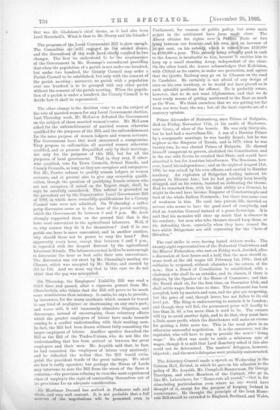The other change is the decision come to on the
subject of the vote of married women for any Local Government election. Last Thursday week, Mr. McLaren defeated the Government on the subject of these married women's votes. Mr. McLaren asked for the enfranchisement of married women otherwise qualified for the purposes of the Bill, and the enfranchisement for the same purpose of women lodgers and women servants. The Government have this week announced a compromise. They propose to enfranchise all married women otherwise qualified, and at present disqualified only by their marriage, not only for the purposes of this Bill, but for all the purposes of local government. That is, they may, if other- wise qualified, vote for Town Councils, School Boards, and County Councils, so long as they are occupiers and ratepayers. But Mr. Fowler refuses to qualify women lodgers or women servants, and at present also to give any ownership qualifi- cation, though the question of qualifying female owners who are not occupiers, if raised on the Report stage, shall, he says, be carefully considered. This refusal is grounded on the precedent set by the Conservative Local Government Bill of 1888, in which mere ownership qualifications for a County Council vote were not admitted. On Wednesday, a rather petty discussion arose as to the hour of the parish meeting, which the Government fix between 6 and 8 p.m. Mr. Arch strongly supported them on the ground that that is the hour most convenient to the agricultural labourers. Well, if so, why cannot they fix it for themselves P And if in one parish one hour is more convenient, and in another another, wby should there not be power to vary the hour P But apparently every hour, except that between 6 and 8 p.m., is regarded with the deepest distrust by the agricultural labourers' friends. The labourers are not held to be men enough to determine the hour as best suits their own convenience. The discussion was cut short by Mr. Ohanning's moving the Closure, which was accepted by Mr. Mellor, and carried by 201 to 136. And. we must say that in this case we do not think that the gag was misapplied.






































 Previous page
Previous page